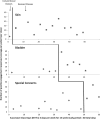Peer-led, transformative learning approaches increase classroom engagement in care self-management classes during inpatient rehabilitation of individuals with spinal cord injury
- PMID: 29037112
- PMCID: PMC6522966
- DOI: 10.1080/10790268.2017.1385992
Peer-led, transformative learning approaches increase classroom engagement in care self-management classes during inpatient rehabilitation of individuals with spinal cord injury
Abstract
Objective: Evaluate effects of revised education classes on classroom engagement during inpatient rehabilitation for individuals with spinal cord injury/disease (SCI/D).
Design: Multiple-baseline, quasi-experimental design with video recorded engagement observations during conventional and revised education classes; visual and statistical analysis of difference in positive engagement responses observed in classes using each approach.
Participants/setting: 81 patients (72% male, 73% white, mean age 36 SD 15.6) admitted for SCI/D inpatient rehabilitation in a non-profit rehabilitation hospital, who attended one or more of 33 care self-management education classes that were video recorded. All study activities were approved by the host facility institutional review board.
Intervention: Conventional nurse-led self-management classes were replaced with revised peer-led classes incorporating approaches to promote transformative learning. Revised classes were introduced across three subject areas in a step-wise fashion over 15 weeks.
Outcome measure: Positive engagement responses (asking questions, participating in discussion, gesturing, raising hand, or otherwise noting approval) were documented from video recordings of 14 conventional and 19 revised education classes.
Results: Significantly higher average (per patient per class) positive engagement responses were observed in the revised compared to conventional classes (p=0.008).
Conclusion: Redesigning SCI inpatient rehabilitation care self-management classes to promote transformative learning increased patient engagement. Additional research is needed to examine longer term outcomes and replicability in other settings.
Keywords: Care self-management; Education; Mentoring; Peer group; Rehabilitation; Spinal cord injuries.
Figures


Similar articles
-
Peer mentoring reduces unplanned readmissions and improves self-efficacy following inpatient rehabilitation for individuals with spinal cord injury.J Spinal Cord Med. 2021 May;44(3):383-391. doi: 10.1080/10790268.2019.1645407. Epub 2019 Aug 12. J Spinal Cord Med. 2021. PMID: 31403374 Free PMC article.
-
Using One-on-One Peer Mentors to Help Patients with a Spinal Cord Injury Transition from Rehabilitation to Home [Internet].Washington (DC): Patient-Centered Outcomes Research Institute (PCORI); 2020 Jul. Washington (DC): Patient-Centered Outcomes Research Institute (PCORI); 2020 Jul. PMID: 39680698 Free Books & Documents. Review.
-
Effects of Peer Mentoring on Self-Efficacy and Hospital Readmission After Inpatient Rehabilitation of Individuals With Spinal Cord Injury: A Randomized Controlled Trial.Arch Phys Med Rehabil. 2017 Aug;98(8):1526-1534.e2. doi: 10.1016/j.apmr.2017.02.018. Epub 2017 Mar 23. Arch Phys Med Rehabil. 2017. PMID: 28342829 Clinical Trial.
-
The SCIRehab project: treatment time spent in SCI rehabilitation. Nursing bedside education and care management time during inpatient spinal cord injury rehabilitation.J Spinal Cord Med. 2011;34(2):205-15. doi: 10.1179/107902611X12971826988255. J Spinal Cord Med. 2011. PMID: 21675359 Free PMC article.
-
Folic acid supplementation and malaria susceptibility and severity among people taking antifolate antimalarial drugs in endemic areas.Cochrane Database Syst Rev. 2022 Feb 1;2(2022):CD014217. doi: 10.1002/14651858.CD014217. Cochrane Database Syst Rev. 2022. PMID: 36321557 Free PMC article.
Cited by
-
An Investigation of Occupational Therapists' and Physical Therapists' Perspectives on the Process of Change That Occurs among Clients during Rehabilitation, Including Their Use of Response Shift and Transformative Learning.Physiother Can. 2019 Fall;71(4):355-366. doi: 10.3138/ptc-2018-0047. Physiother Can. 2019. PMID: 31762546 Free PMC article.
-
The SUCCESS Peer Mentoring Program for College Students with Concussion: Preliminary Results of a Mobile Technology Delivered Intervention.Int J Environ Res Public Health. 2023 Apr 7;20(8):5438. doi: 10.3390/ijerph20085438. Int J Environ Res Public Health. 2023. PMID: 37107720 Free PMC article.
-
A scoping review of peer-led interventions following spinal cord injury.Spinal Cord. 2019 Aug;57(8):626-635. doi: 10.1038/s41393-019-0297-x. Epub 2019 May 23. Spinal Cord. 2019. PMID: 31123333
-
Impact of a pain education program for people with spinal cord injury who experience neuropathic pain.Front Pain Res (Lausanne). 2025 May 27;6:1569446. doi: 10.3389/fpain.2025.1569446. eCollection 2025. Front Pain Res (Lausanne). 2025. PMID: 40496137 Free PMC article.
-
Peer mentoring reduces unplanned readmissions and improves self-efficacy following inpatient rehabilitation for individuals with spinal cord injury.J Spinal Cord Med. 2021 May;44(3):383-391. doi: 10.1080/10790268.2019.1645407. Epub 2019 Aug 12. J Spinal Cord Med. 2021. PMID: 31403374 Free PMC article.
References
-
- Consortium for Spinal Cord Medicine Neurogenic bowel management in adults with spinal cord injury: A clinical practice guideline for health-care professionals. Washington, DC: Paralyzed Veterans of America; 1998.
-
- Consortium for Spinal Cord Medicine Respiratory management following spinal cord injury: A clinical practice guideline for health-care professionals. Washington, DC: Paralyzed Veterans of America; 2005. - PubMed
-
- Consortium for Spinal Cord Medicine Pressure ulcer prevention and treatment following spinal cord injury: A clinical practice guideline for health-care professionals Washington, DC: Paralyzed Veterans of America; 2001. - PubMed
Publication types
MeSH terms
LinkOut - more resources
Full Text Sources
Other Literature Sources
Medical
